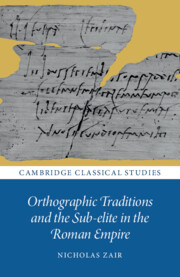Orthographic Traditions and the Sub-elite in the Roman Empire
This book makes use of digital corpora to give in-depth details of the history and development of the spelling of Latin. It focusses on sub-elite texts in the Roman empire and reveals that sophisticated education in this area was not restricted to those at the top of society. Nicholas Zair studies the history of particular orthographic features and traces their usage in a range of texts which give insight into everyday writers of Latin, including scribes and soldiers at Vindolanda, slaves at Pompeii, members of the Praetorian Guard and writers of curse tablets. In doing so, he problematises the use of ‘old-fashioned’ spelling in dating inscriptions, provides important new information on sound change in Latin and shows how much can be gained from a detailed sociolinguistic analysis of ancient texts.
Nicholas Zair is Senior Lecturer in Classics (Classical Linguistics and Comparative Philology) at the University of Cambridge and Fellow in Classics and Linguistics at Peterhouse. He recently held a Pro Futura Scientia Fellowship at SCAS (Uppsala) and CRASSH (Cambridge). He is also the author of The Reflexes of the Proto-Indo-European Laryngeals in Celtic (2012) and Oscan in the Greek Alphabet (Cambridge, 2016), and co-editor of Migration, Mobility and Language Contact in and around the Ancient Mediterranean (Cambridge, 2020).

